必修三 Unit 8 Adventure Lesson 4 Journey to the Antarctic 课件 (32张ppt)
文档属性
| 名称 | 必修三 Unit 8 Adventure Lesson 4 Journey to the Antarctic 课件 (32张ppt) |  | |
| 格式 | zip | ||
| 文件大小 | 536.7KB | ||
| 资源类型 | 教案 | ||
| 版本资源 | 北师大版 | ||
| 科目 | 英语 | ||
| 更新时间 | 2016-04-15 20:17:15 | ||
图片预览


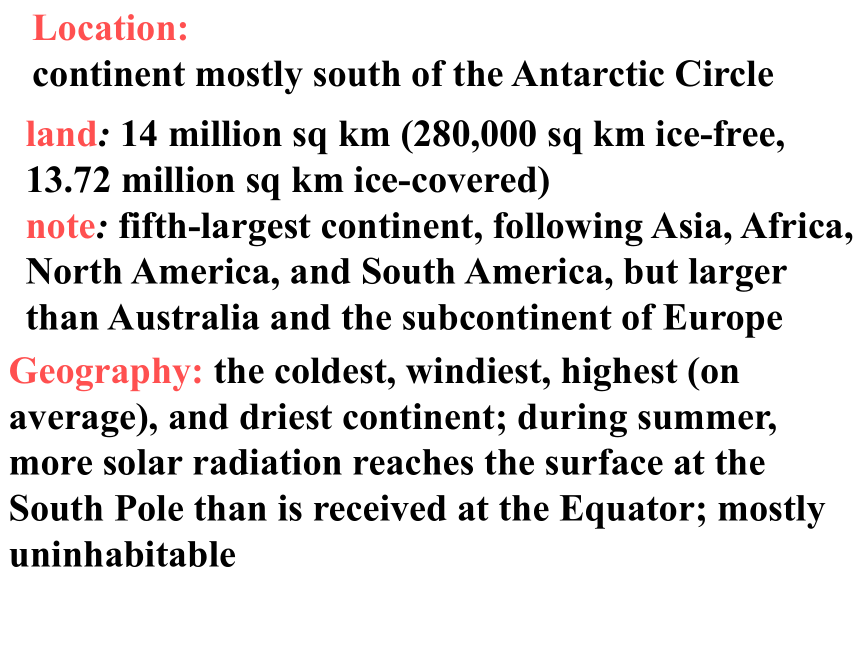
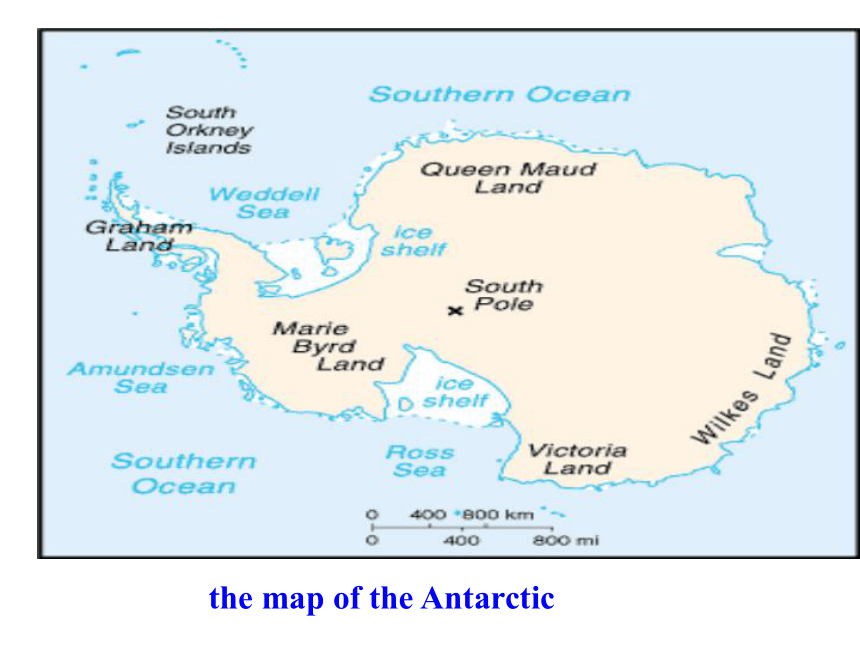
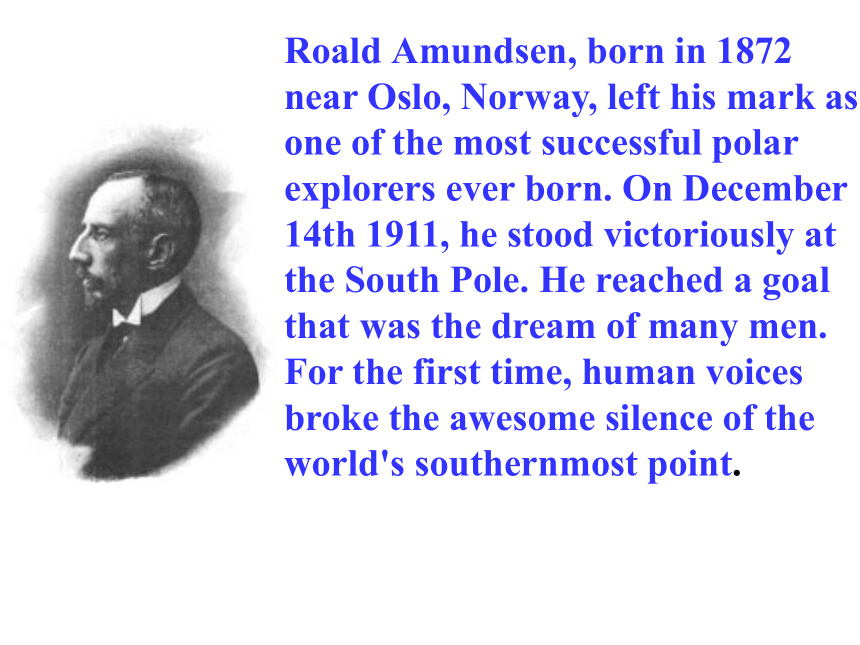
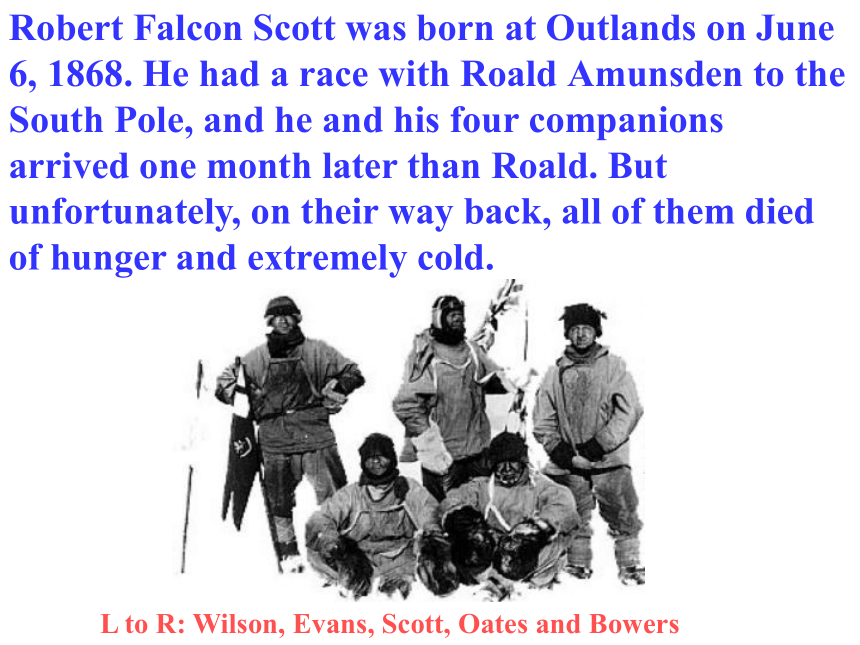
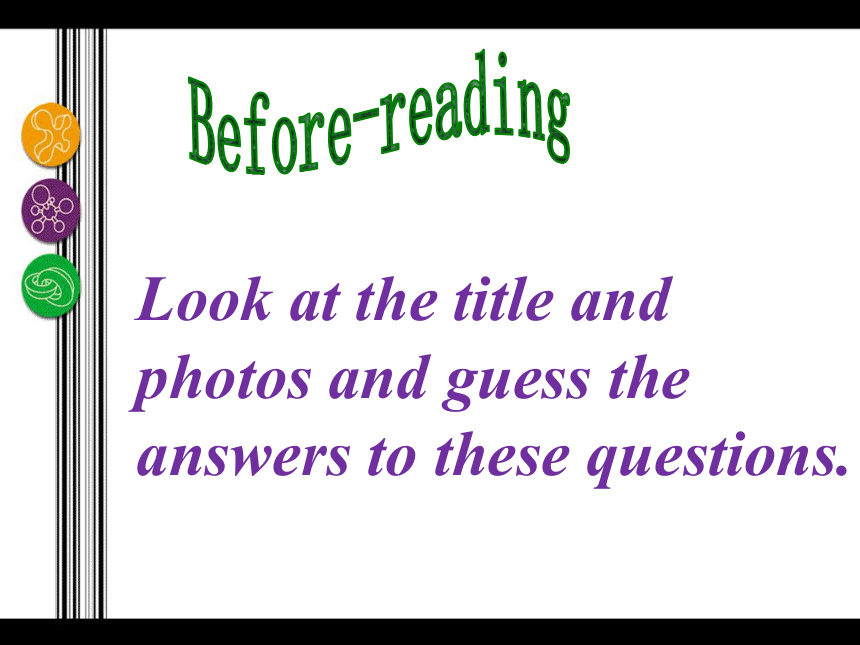
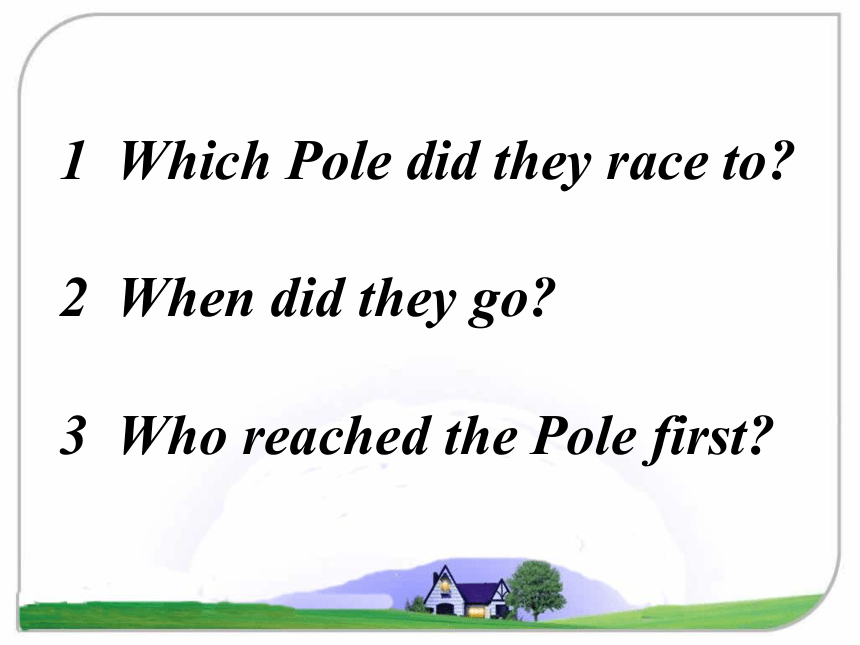
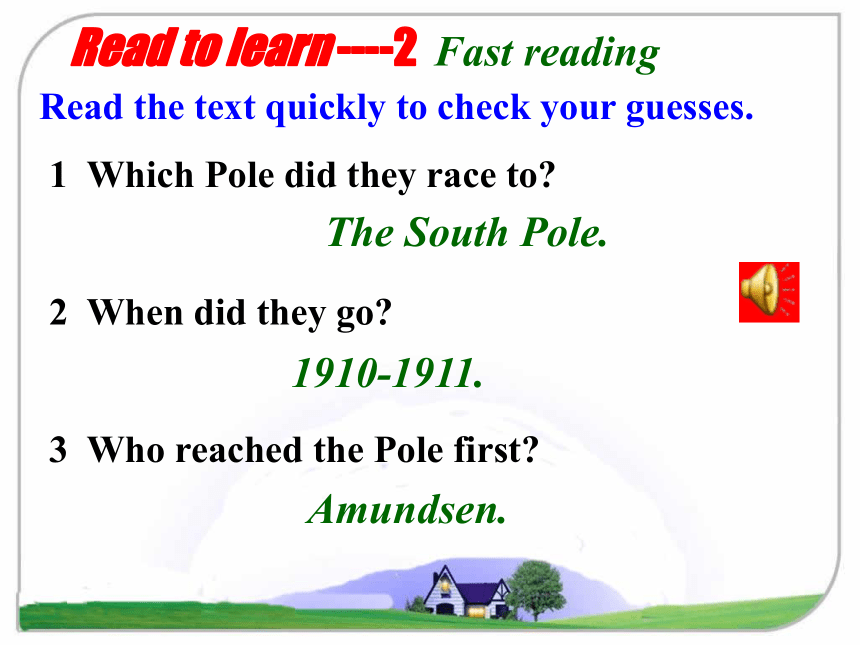
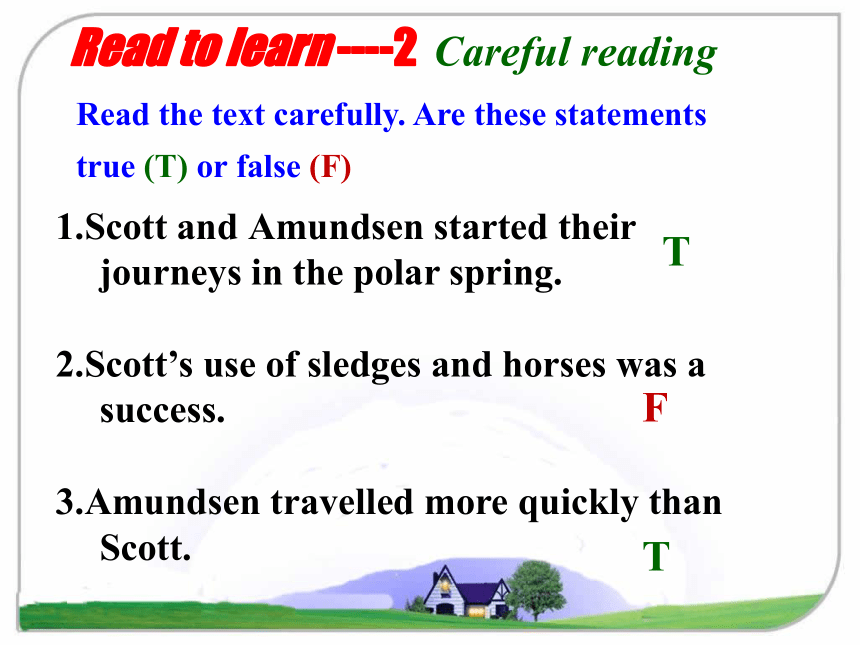
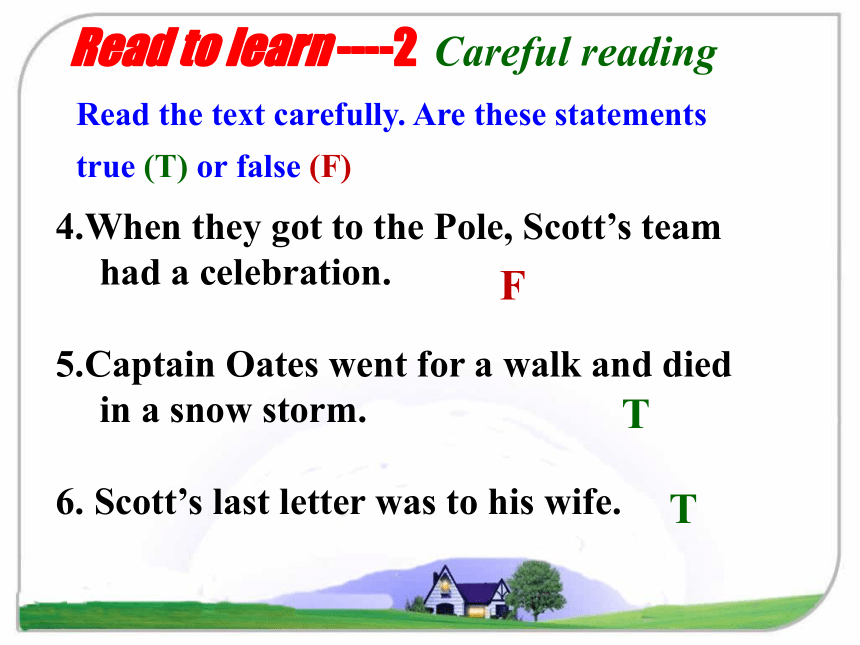
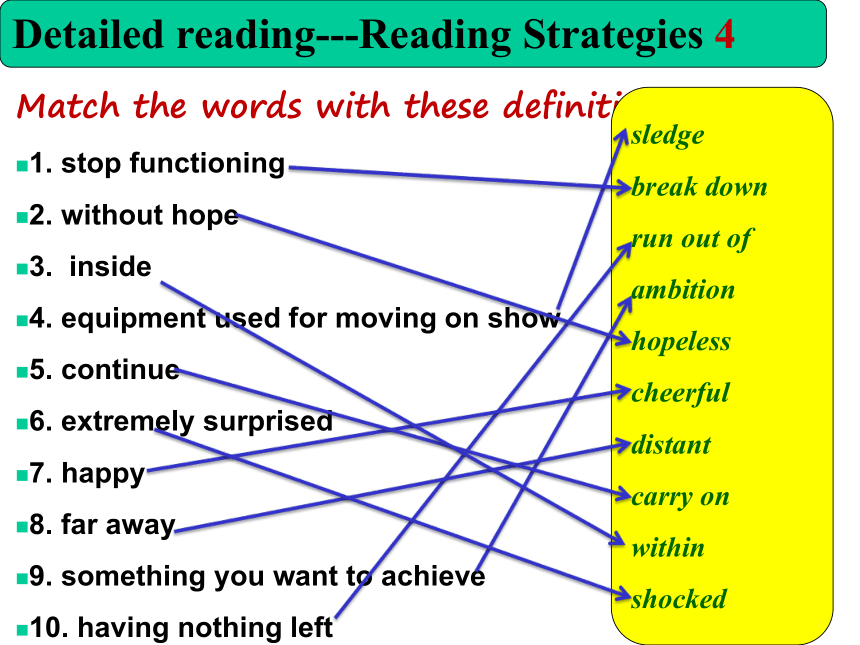
文档简介
课件32张PPT。Unit 8 AdventureJourney to the AntarcticDo you know anything about the Antarctic?land: 14 million sq km (280,000 sq km ice-free, 13.72 million sq km ice-covered) note: fifth-largest continent, following Asia, Africa, North America, and South America, but larger than Australia and the subcontinent of Europe Location: continent mostly south of the Antarctic Circle Geography: the coldest, windiest, highest (on average), and driest continent; during summer, more solar radiation reaches the surface at the South Pole than is received at the Equator; mostly uninhabitable the map of the AntarcticRoald Amundsen, born in 1872 near Oslo, Norway, left his mark as one of the most successful polar explorers ever born. On December 14th 1911, he stood victoriously at the South Pole. He reached a goal that was the dream of many men. For the first time, human voices broke the awesome silence of the world's southernmost point.
Robert Falcon Scott was born at Outlands on June 6, 1868. He had a race with Roald Amunsden to the South Pole, and he and his four companions arrived one month later than Roald. But unfortunately, on their way back, all of them died of hunger and extremely cold.
L to R: Wilson, Evans, Scott, Oates and Bowers Before-readingLook at the title and photos and guess the answers to these questions.1 Which Pole did they race to?
2 When did they go?
3 Who reached the Pole first?Read the text quickly to check your guesses.Read to learn ----2 Fast readingThe South Pole.1910-1911.1 Which Pole did they race to?
2 When did they go?
3 Who reached the Pole first? Amundsen.Read the text carefully. Are these statements true (T) or false (F)Read to learn ----2 Careful reading1.Scott and Amundsen started their journeys in the polar spring.
2.Scott’s use of sledges and horses was a success.
3.Amundsen travelled more quickly than Scott.TFTRead the text carefully. Are these statements true (T) or false (F)Read to learn ----2 Careful reading4.When they got to the Pole, Scott’s team had a celebration.
5.Captain Oates went for a walk and died in a snow storm.
6. Scott’s last letter was to his wife.FTTMatch the words with these definitions.
1. stop functioning
2. without hope
3. inside
4. equipment used for moving on show
5. continue
6. extremely surprised
7. happy
8. far away
9. something you want to achieve
10. having nothing left
Detailed reading---Reading Strategies 4sledge
break down
run out of
ambition
hopeless
cheerful
distant
carry on
within
shockedRead the text again and answer the questions.Detailed reading ----51 Why did Amundsen succeed and Scott fail?
2 What did Scott's team achieve?
Why did Scott and his men become heroes?
How did you feel after reading the story?Read the text again and answer the questions.Detailed reading ----5Amundsen succeeded because he made rapid progress because he had teams of dogs pulling the sledges and his men were on skis. Scott failed because he and his men had to push the sledges themselves when the motor sledges broke down and the ponies had difficulties with the snow and the cold.1 Why did Amundsen succeed and Scott fail?Read the text again and answer the questions.Detailed reading ----5The reached the Pole although they didn't win the race and they became heroes because of their courage. They collected rocks that proved Antarctica had once been covered by plants.2 What did Scott's team achieve?Read the text again and answer the questions.Detailed reading ----5They became heroes because, although they died on the return journey, they showed remarkable courage all the time.3 Why did Scott and his men become heroes?4 How did you feel after reading the story?Give your own opinion and feelings.Complete the sentences.Vocabulary: Wordbuilding----6They had done so much __________ (prepare) that the actual task was easy for them.
Without food, water, or a map, their situation was _________ (hope).
Even with all her problems, she is still ______ (cheer) every day.
He wanted to get away from everything so he moved to a ___________ (distance) land.
Everyone experienced ___________ (sad) at the terrible news.
All the exams have different levels of __________ (difficult).preparationhopelesscheerfuldistantsadnessdifficultyMake adjectives, verbs or adverbs from these nouns.Vocabulary: Wordbuilding----7Language points1. expedition : 探险;远征;探险队
go on an expedition 去探险
make an expedition 远征,探险
a polar expedition 极地探险队2. prepare V.
prepare …for…
e.g. Please prepare a table for dinner.
Hope for the best and prepare for the
worst.preparation n.
in preparation for 为…作准备
They put chairs in the school hall in
preparation for the concerts.
Joe is training in preparation for the next
football match.
in preparation 在准备中
Plans for selling the new product are
now in preparation.
wait for sb. / sth. He waited impatiently for an answer
. wait to do sth
I can tell you something you’ve been
waiting to know.
4. pull the sledge 拉雪橇
push the sledge 推雪橇
5. make progress in/with sth.
progress 不可数名词
e.g. Are you making any progress with your study?
They are making slow progress in
the construction of the new road.
6. break down
a. 机器,车辆等坏了
We are sorry to arrive late, but the car
broke down.
b. 身体跨了
His health broke down.
c. 失败,坚持不下去了
The plan was well conceived, but it
broke down because people are
unwilling to cooperate.break in 蹩脚英语
break in on/upon 非法进入,强行进入
break out 使人心碎
break one’s heart 爆发,突然讲出
broken English 打搅,使停顿 7. besides prep. & adv.
prep. 除了
e.g. Besides you, no one is qualified.
What has he done, besides reading
the paper?
adv. 此外,除此之外
e.g. Besides, I want you to promise me
one thing.
Her intention were good. Besides, it
was pleasant to be with her.except prep. 除去,除掉
e.g. They all went to sleep except the
young Frenchman.
We go there every day except Sunday.
except for 除了有…之外
e.g. Your composition is good except for
a few spelling mistakes.
Except for one old lady, the bus was
empty.8. have difficulty/problem with sth.
have difficulty/problem (in) doing sth.
e.g. I don’t have much difficulty with
English grammar.
He has some difficulties understanding that man’s accent.
difficulty 可做可数名词也可做不可数名
词.
9.spend
sb. spend …on sth.
sb. spend … (in) doing sth.
e.g. He doesn’t spend much time on his
homework.
He spent much time correcting my
grammar.10. fail vi. 失败
e.g. All our plans failed.
fail in sth. 在…不足,在…失败.
e.g. He has failed in his mathematics.
She failed in her last English exam.
fail to do sth. 没有能够,没有
e.g. He fails to understand its real
significance.
When I failed to find you ,I sent you a
note by messenger.Homework:
Finish exercises on page 72.
Robert Falcon Scott was born at Outlands on June 6, 1868. He had a race with Roald Amunsden to the South Pole, and he and his four companions arrived one month later than Roald. But unfortunately, on their way back, all of them died of hunger and extremely cold.
L to R: Wilson, Evans, Scott, Oates and Bowers Before-readingLook at the title and photos and guess the answers to these questions.1 Which Pole did they race to?
2 When did they go?
3 Who reached the Pole first?Read the text quickly to check your guesses.Read to learn ----2 Fast readingThe South Pole.1910-1911.1 Which Pole did they race to?
2 When did they go?
3 Who reached the Pole first? Amundsen.Read the text carefully. Are these statements true (T) or false (F)Read to learn ----2 Careful reading1.Scott and Amundsen started their journeys in the polar spring.
2.Scott’s use of sledges and horses was a success.
3.Amundsen travelled more quickly than Scott.TFTRead the text carefully. Are these statements true (T) or false (F)Read to learn ----2 Careful reading4.When they got to the Pole, Scott’s team had a celebration.
5.Captain Oates went for a walk and died in a snow storm.
6. Scott’s last letter was to his wife.FTTMatch the words with these definitions.
1. stop functioning
2. without hope
3. inside
4. equipment used for moving on show
5. continue
6. extremely surprised
7. happy
8. far away
9. something you want to achieve
10. having nothing left
Detailed reading---Reading Strategies 4sledge
break down
run out of
ambition
hopeless
cheerful
distant
carry on
within
shockedRead the text again and answer the questions.Detailed reading ----51 Why did Amundsen succeed and Scott fail?
2 What did Scott's team achieve?
Why did Scott and his men become heroes?
How did you feel after reading the story?Read the text again and answer the questions.Detailed reading ----5Amundsen succeeded because he made rapid progress because he had teams of dogs pulling the sledges and his men were on skis. Scott failed because he and his men had to push the sledges themselves when the motor sledges broke down and the ponies had difficulties with the snow and the cold.1 Why did Amundsen succeed and Scott fail?Read the text again and answer the questions.Detailed reading ----5The reached the Pole although they didn't win the race and they became heroes because of their courage. They collected rocks that proved Antarctica had once been covered by plants.2 What did Scott's team achieve?Read the text again and answer the questions.Detailed reading ----5They became heroes because, although they died on the return journey, they showed remarkable courage all the time.3 Why did Scott and his men become heroes?4 How did you feel after reading the story?Give your own opinion and feelings.Complete the sentences.Vocabulary: Wordbuilding----6They had done so much __________ (prepare) that the actual task was easy for them.
Without food, water, or a map, their situation was _________ (hope).
Even with all her problems, she is still ______ (cheer) every day.
He wanted to get away from everything so he moved to a ___________ (distance) land.
Everyone experienced ___________ (sad) at the terrible news.
All the exams have different levels of __________ (difficult).preparationhopelesscheerfuldistantsadnessdifficultyMake adjectives, verbs or adverbs from these nouns.Vocabulary: Wordbuilding----7Language points1. expedition : 探险;远征;探险队
go on an expedition 去探险
make an expedition 远征,探险
a polar expedition 极地探险队2. prepare V.
prepare …for…
e.g. Please prepare a table for dinner.
Hope for the best and prepare for the
worst.preparation n.
in preparation for 为…作准备
They put chairs in the school hall in
preparation for the concerts.
Joe is training in preparation for the next
football match.
in preparation 在准备中
Plans for selling the new product are
now in preparation.
wait for sb. / sth. He waited impatiently for an answer
. wait to do sth
I can tell you something you’ve been
waiting to know.
4. pull the sledge 拉雪橇
push the sledge 推雪橇
5. make progress in/with sth.
progress 不可数名词
e.g. Are you making any progress with your study?
They are making slow progress in
the construction of the new road.
6. break down
a. 机器,车辆等坏了
We are sorry to arrive late, but the car
broke down.
b. 身体跨了
His health broke down.
c. 失败,坚持不下去了
The plan was well conceived, but it
broke down because people are
unwilling to cooperate.break in 蹩脚英语
break in on/upon 非法进入,强行进入
break out 使人心碎
break one’s heart 爆发,突然讲出
broken English 打搅,使停顿 7. besides prep. & adv.
prep. 除了
e.g. Besides you, no one is qualified.
What has he done, besides reading
the paper?
adv. 此外,除此之外
e.g. Besides, I want you to promise me
one thing.
Her intention were good. Besides, it
was pleasant to be with her.except prep. 除去,除掉
e.g. They all went to sleep except the
young Frenchman.
We go there every day except Sunday.
except for 除了有…之外
e.g. Your composition is good except for
a few spelling mistakes.
Except for one old lady, the bus was
empty.8. have difficulty/problem with sth.
have difficulty/problem (in) doing sth.
e.g. I don’t have much difficulty with
English grammar.
He has some difficulties understanding that man’s accent.
difficulty 可做可数名词也可做不可数名
词.
9.spend
sb. spend …on sth.
sb. spend … (in) doing sth.
e.g. He doesn’t spend much time on his
homework.
He spent much time correcting my
grammar.10. fail vi. 失败
e.g. All our plans failed.
fail in sth. 在…不足,在…失败.
e.g. He has failed in his mathematics.
She failed in her last English exam.
fail to do sth. 没有能够,没有
e.g. He fails to understand its real
significance.
When I failed to find you ,I sent you a
note by messenger.Homework:
Finish exercises on page 72.
